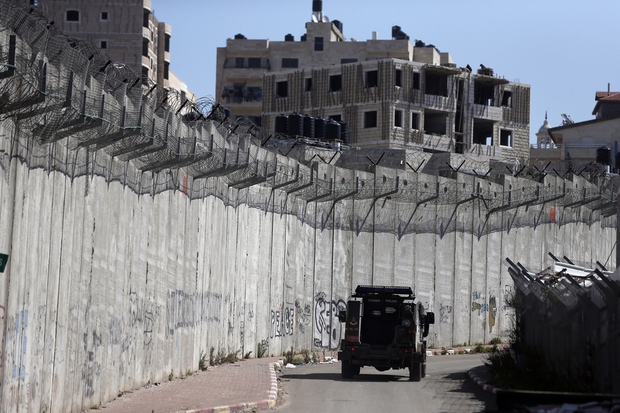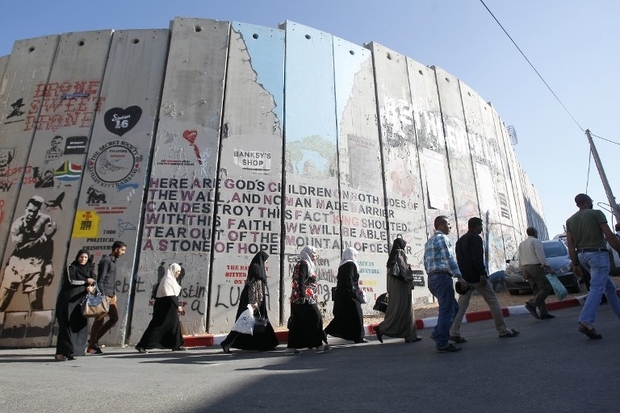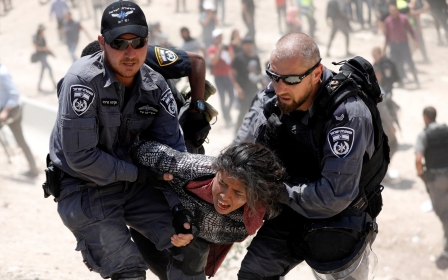International law gave a clear ruling against Israel's wall. But nothing happened

The Israeli-Palestinian conflict is one of the most complex, multi-layered and protracted conflicts of modern times. One of the many merits of Mohammed Alatar's documentary Broken: A Palestinian Journey Through International Law is that it does not attempt to cover, as so many other programmes have done, the entire history and tangled politics of this conflict.
Instead, it focuses on only one aspect: the separation wall that Israel started building in 2002 in the West Bank and the question of whether it is in keeping with international law.
At first sight, it may seem that the answer is simple and straightforward. Since most of the wall is built on occupied Palestinian territory, and since it is designed to protect Israeli settlements that are themselves illegal, the wall itself must be illegal. But this is not purely a legal issue; rather, it is a bitterly contested political issue.
Tactical mistake
The documentary does justice to the legal issues by placing them in this proper political context. It begins by tracing a series of votes in the United Nations General Assembly, which culminated in the referral of the question to the International Court of Justice (ICJ) in the Hague for an advisory opinion.
The proceedings of the ICJ were recorded, and extracts from those proceedings are used in the film to brilliantly illuminating effect. Israel denied that the ICJ had jurisdiction in this matter, so it refused to appear in court, though it did submit written material.
The question that troubled him most was: Why was the clear ruling of the ICJ never implemented?
This was a bad tactical mistake: it displayed disrespect for the court and disrespect for the judges. It also meant that only the Palestinian side was presented before the court - and it was presented by a number of erudite and eloquent advocates. The main thrust of this case was that "while Israel was perfectly entitled to build the wall on its own territory, constructing the wall on occupied Palestinian territory is contrary to international law".
Common sense pointed in the same direction as international law. There is an English saying that good fences make good neighbours. But fences do not make good neighbours when the fence is constructed in the middle of the neighbour's garden!
The court ruled that the wall was illegal, but this was only an advisory opinion. Although the ruling was endorsed by the UN General Assembly by a vote of 150 against six, it was never implemented.
Role of the judges
The second part of the film consists of a fascinating series of interviews with some of the judges. We get to hear their views on the treatment of the case by the ICJ and about the nature and limits of international law.
Of particular interest are the interviews with one German and one Jewish-American judge. The German judge came under attack for allegedly denying Israel the right to defend itself. His defence was that nationality is irrelevant: he was on the bench not as a German, but as a judge. As a judge, his job was to apply the law without fear or favour.
The Jewish judge, who was a Holocaust survivor, registered the only dissenting opinion. He did not challenge the ruling, but he did think that the ICJ had no jurisdiction to pronounce on this palpably political issue, and that it was a mistake on the part of the General Assembly to refer the case to the ICJ in the first place.
The director, Mohammed Alatar, is a Jordanian-American who lives in Ramallah in the occupied West Bank. He has to his credit two previous films that deal with the Israeli-Palestinian conflict: The Iron Wall and Jerusalem: The East Side Story.
Palestinians let down
The question that troubled him most was: why was the clear ruling of the ICJ never implemented? This is a question he posed to all of the judges who agreed to be interviewed for this film, but none of their answers appeared to satisfy him. His sympathies lie with Palestinians, and he feels - with good reason - that in this case, international law let them down.
Broken was long in the making because it involved so many different actors in different locations. But it was well worth waiting for. Alatar has produced a first-rate documentary that sheds a great deal of light on the intersection between law and politics in one of the world's most persistent trouble spots.
- Avi Shlaim is an emeritus professor of International Relations at the University of Oxford and author of The Iron Wall: Israel and the Arab World.
The views expressed in this article belong to the author and do not necessarily reflect the editorial policy of Middle East Eye.
Photo: Israel’s separation wall is considered to be illegal under international law (AFP)
New MEE newsletter: Jerusalem Dispatch
Sign up to get the latest insights and analysis on Israel-Palestine, alongside Turkey Unpacked and other MEE newsletters
Middle East Eye delivers independent and unrivalled coverage and analysis of the Middle East, North Africa and beyond. To learn more about republishing this content and the associated fees, please fill out this form. More about MEE can be found here.






